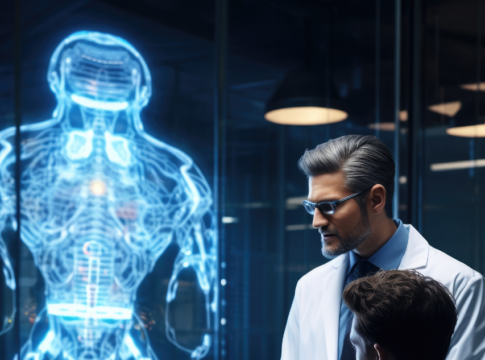Artificial Intelligence (AI) is revolutionizing healthcare diagnostics, offering unprecedented advancements in the accuracy, efficiency, and speed of disease detection. By leveraging sophisticated algorithms and large datasets, AI has the potential to transform how medical conditions are identified and managed. However, alongside these breakthroughs come significant challenges that must be addressed to fully realize the benefits of AI in healthcare.
Breakthroughs in AI Healthcare Diagnostics
One of the most notable breakthroughs in AI healthcare diagnostics is its ability to analyze medical imaging with remarkable precision. AI-powered tools, such as those using deep learning algorithms, can interpret images from MRI, CT scans, and X-rays to detect abnormalities such as tumors, fractures, or lesions. These tools are not only enhancing the accuracy of diagnoses but also reducing the time required for analysis. For instance, AI systems can quickly highlight areas of concern, allowing radiologists to focus their attention on critical findings and improving overall diagnostic efficiency.
Another significant advancement is AI’s role in predictive analytics and risk assessment. By analyzing vast amounts of patient data, including electronic health records (EHRs), genetic information, and lifestyle factors, AI can identify individuals at high risk for certain diseases before symptoms even appear. This proactive approach enables early intervention and personalized treatment plans, potentially improving patient outcomes and reducing healthcare costs.
AI is also making strides in the field of genomics. Algorithms are now capable of analyzing complex genetic data to identify mutations associated with genetic disorders. This capability not only aids in diagnosing rare diseases but also assists in tailoring treatment strategies based on individual genetic profiles, paving the way for more personalized medicine.
Challenges and Considerations
Despite these promising advancements, several challenges must be addressed to fully integrate AI into healthcare diagnostics. One major concern is the quality and diversity of the data used to train AI models. AI systems rely on large datasets to learn and make predictions. If these datasets are not diverse and representative of the patient population, there is a risk of biased outcomes that could exacerbate health disparities.
Another challenge is ensuring the interpretability and transparency of AI algorithms. Healthcare professionals need to understand how AI systems arrive at their conclusions to trust and effectively integrate them into clinical decision-making. Efforts are ongoing to develop models that provide clear explanations of their reasoning, but achieving this remains a complex task.
Data privacy and security are also critical issues. The integration of AI in healthcare involves handling sensitive patient information, which necessitates stringent measures to protect against breaches and unauthorized access. Compliance with regulations such as the Health Insurance Portability and Accountability Act (HIPAA) is essential to safeguard patient data.
Lastly, the adoption of AI in healthcare diagnostics requires ongoing validation and regulatory approval. Ensuring that AI tools meet rigorous standards for accuracy and safety is crucial before they can be widely implemented in clinical settings.
Conclusion
AI is poised to revolutionize healthcare diagnostics with its potential to enhance accuracy, speed, and personalized care. However, realizing these benefits requires addressing challenges related to data quality, algorithm transparency, privacy, and regulatory approval. As technology continues to evolve, a collaborative approach involving researchers, clinicians, and policymakers will be essential to harness the full potential of AI while ensuring it is used responsibly and effectively.
